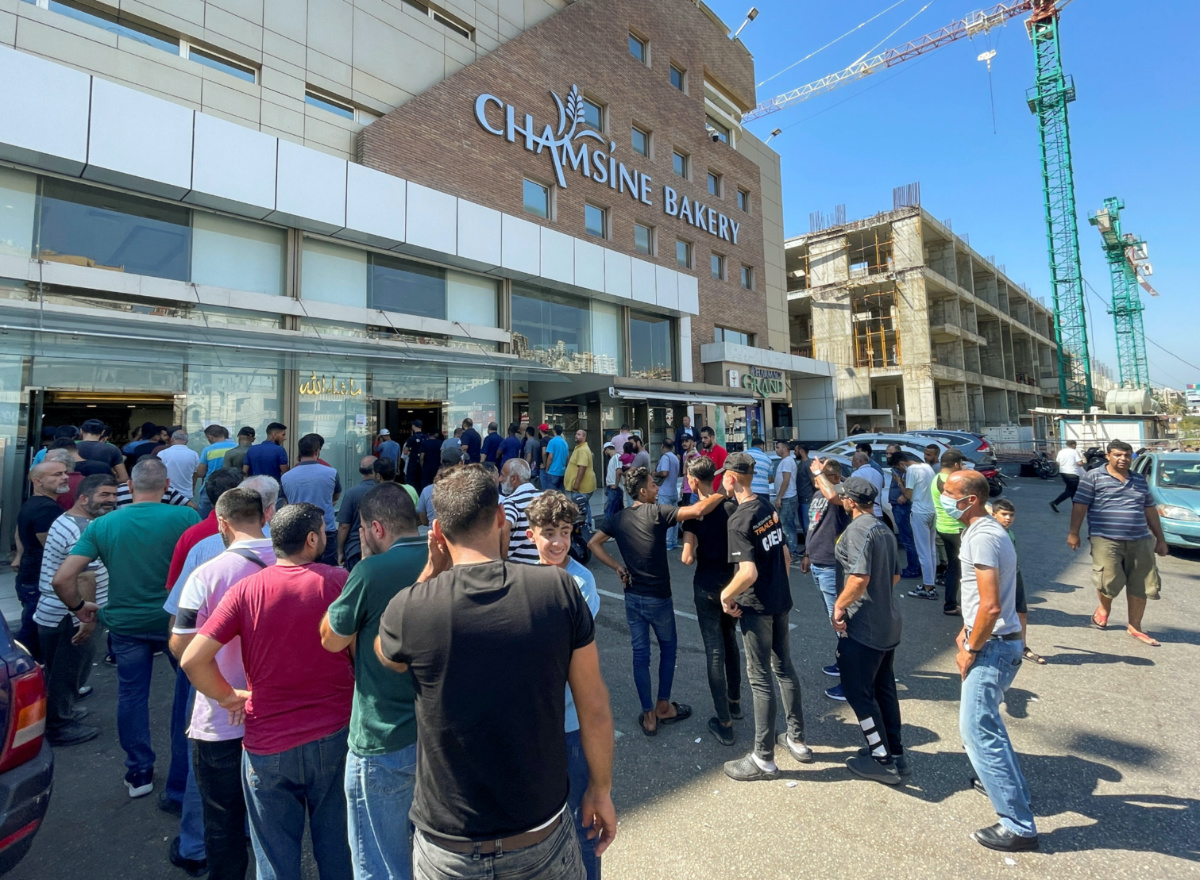Beirut, Lebanon
Reuters
Mohamed Abu Khodr had been waiting for hours outside a Beirut bakery in hopes of buying two bags of subsidised bread he needs to feed his family. But there was no sign of the doors opening for him or the dozens of other people outside.
“During the war, we were not humiliated like this,” said Abu Khodr, 57, a father of four, recalling Lebanon’s 1975-90 civil conflict as he stood in a crowd on Thursday outside the bakery in the southern suburbs of Beirut.

People queue to buy bread outside a bakery in Khaldeh, Lebanon, on 28th July. PICTURE: Reuters/Issam Abdallah.
With many Lebanese already struggling to get by in a devastating economic meltdown, shortages of state-subsidised bread have compounded hardship and prompted numerous brawls at bakeries. In some incidents, guns have been fired in the air.
The problem has grown more acute since the onset of the Ukraine war, which disrupted wheat shipments from Lebanon’s main grain supplier.
SYRIAN SHIP CARRYING “STOLEN UKRAINIAN BARLEY, FLOUR” DOCKS IN LEBANON, UKRAINIAN EMBASSY SAYS
A Syrian ship under US sanctions has docked in the northern Lebanese port of Tripoli carrying barley and wheat that the Ukrainian embassy in Beirut told Reuters on Thursday had been plundered by Russia from Ukrainian stores.

Syrian-flagged cargo ship Laodicea transits Bosphorus enroute to the Mediterranean Sea, in Istanbul, Turkey, on 23rd July. PICTURE: Reuters/Yoruk Isik
The Laodicea docked in Tripoli on Wednesday, according to shipping data website MarineTraffic.
“The ship has travelled from a Crimean port that is closed to international shipping, carrying 5,000 tonnes of barley and 5,000 tonnes of flour that we suspect was taken from Ukrainian stores,” the embassy told Reuters.
“This is the first time a shipment of stolen grains and flour reaches Lebanon,” the statement said.
Russia has previously denied the allegations that it has stolen Ukrainian grain. An official from the Russian embassy in Lebanon told Reuters it could not immediately comment.
Ukrainian Ambassador Ihor Ostash met Lebanese president Michel Aoun on Thursday to discuss the shipment, telling him that purchasing stolen Ukrainian goods would “harm bilateral ties” between Kyiv and Beirut, the embassy told Reuters.
A Lebanese official confirmed that the issue had been raised during a Thursday meeting with Aoun and noted Ukraine’s general concerns that Russia might try selling stolen Ukrainian wheat to a host of countries including Lebanon.
Lebanon’s economy minister Amin Salam told Reuters that the country’s customs authority and its agriculture ministry were following up on the issue.
Salam had said earlier on Thursday that severe bread shortages in Lebanon would be eased this week by new wheat imports, but did not say where they were coming from.
The agriculture minister, the head of customs and the head of Tripoli port did not immediately respond to requests for comment.
“We are checking the accuracy of the information that has been mentioned in the media, and we have laws and we resort to Lebanese law,” Lebanon’s transport minister Ali Hamie told Reuters.
A customs official and shipping source told Reuters that the Tripoli port had not offloaded the ship due to suspicions it was carrying stolen goods.
“Nothing was taken off of the ship – as soon as we got the information, we stopped everything,” the customs official said.
The Laodicea is one of a trio of ships owned by the Syrian port authority that Ukraine says have been transporting wheat plundered from stores in Ukrainian territory recently overtaken by Russia.
All three ships have been sanctioned by the United States since 2015.
– MAYA GEBEILY, TIMOUR AZHARI, LAILA BASSAM and HUMAYRA PAMUK/Reuters
But the bread shortage is also linked to the complications of the Lebanese financial crisis that has devalued the national currency by more than 90 per cent in three years.
A dietary staple for many, the disc-shaped loaves are baked using flour imported at subsidised exchange rates, creating a huge incentive for corruption and spawning a black market where bread has been sold at multiples of the official price.
Economy Minister Amin Salam attributed the latest supply crisis to theft of flour by traders last month.
In comments to Reuters, he also blamed smuggling and said Syrian war refugees had been buying more than they need to send home or sell in the black market.
A security source said that Syrians have been involved in some of the scuffles at bakeries, including one in a Beirut bakery where a fist fight erupted after pushing between Syrian and Lebanese customers.
“In this very difficult situation, we are witnessing an increase in tensions between different communities,” the UN refugee agency UNHCR said in a statement sent to Reuters.
“UNHCR is also concerned that restrictive practices and discriminatory measures are being introduced based on nationality, impacting, among others, refugees,” it said.
Continued international support to Lebanon is critical to ensure secure access to food and other basic needs, UNHCR said.
Lebanon has been hosting Syrian refugees since the war in began in 2011, estimating them to number 1.5 million.
In a statement issued last week, Najat Rochdi, the UN Resident and Humanitarian Coordinator, noted increased public discussions in Lebanon over the return of Syrian refugees to Syria and called on “everyone to refrain from fuelling the media and social media with negative sentiments and hatred”.
“Great pressure”
Salam said Syrian refugees were putting “very great pressure” on supplies but did not face discrimination.
He expressed hope supply problems will ease within the next few days, saying that 49,000 tonnes of wheat were being unloaded at Beirut port this week, which should last one-and-a-half months.
Salam also noted that parliament had approved a $US150 million World Bank loan for grain, adding that security forces were stepping up monitoring of wheat shipments to prevent theft.
Bakery owners say the authorities have not provided enough subsidised flour, which the economy ministry denies.
Waiting with the crowd outside the bakery in Beirut’s southern suburbs, Khaled Daher said bread was readily available in the black market but at four times the official price of 13,000 Lebanese pounds – around 50 cents at the market exchange rate.
“It’s shameful. This is bread,” he said, adding that there had been none at home since Wednesday.
“Let them open the door of emigration so we can leave,” he said. “We can’t live in our country.”
– Additional reporting by TOM PERRY






